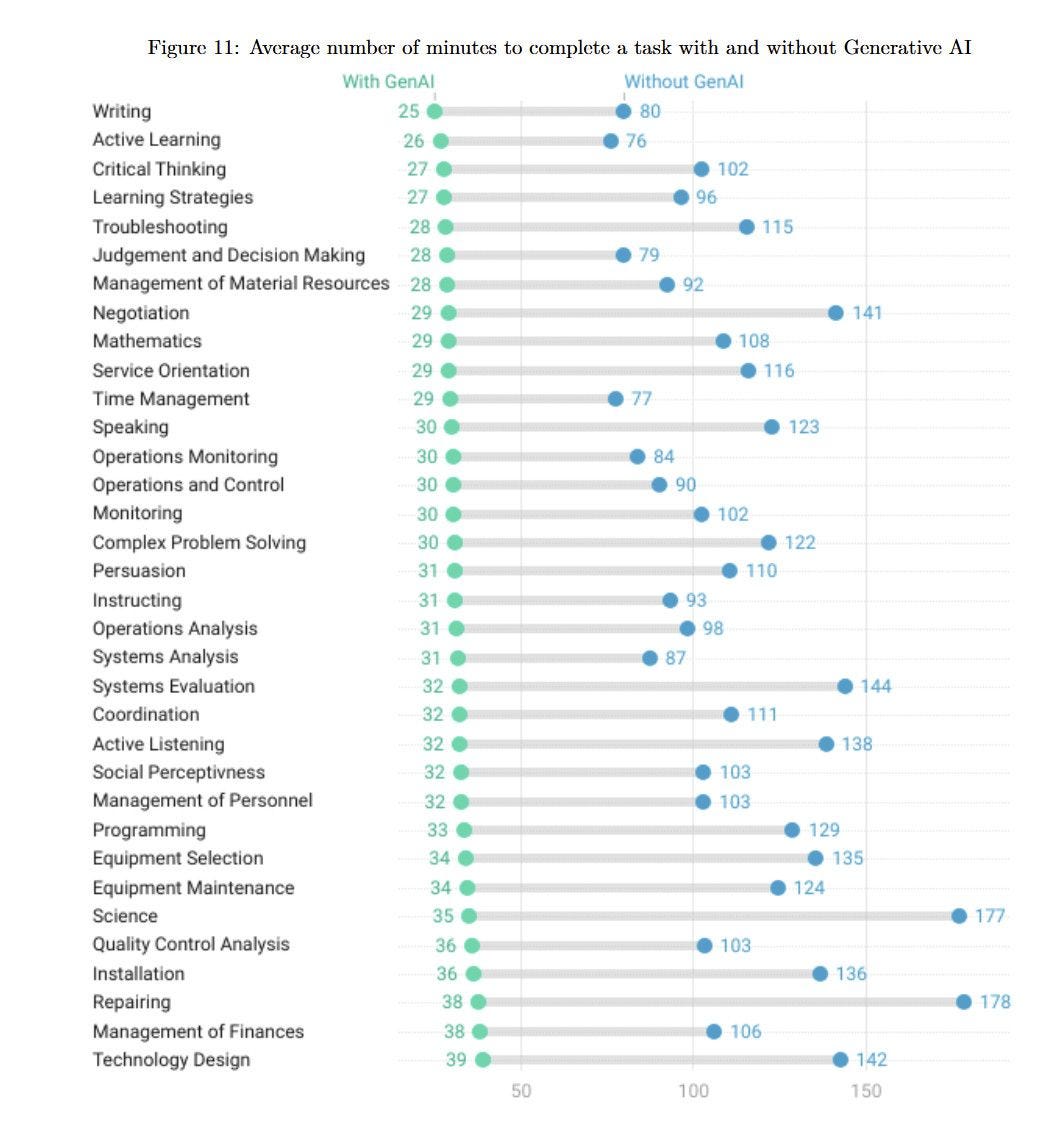Weekly Link Roundup #53
"every system is perfectly designed to get the results it gets" is attributed to W. Edwards Deming (anybody have a citation/source)
Perplexity just made AI research crazy cheap—what that means for the industry: I wish I could remember who has been saying that business models (including pricing models) are evolving as fast as the tech. Oh wait, that was me :-) “The launch exposes a painful truth in AI pricing: Expensive enterprise subscriptions may be unnecessary. While Anthropic and OpenAI charge thousands monthly for their services, Perplexity offers five free queries daily to all users. Pro subscribers pay $20 monthly for 500 daily queries and faster processing — a price point that could force larger AI companies to explain why their services cost up to 100 times more.” > > And look, I just tried this and wowza. At a minimum, I could hand it in for an A in upper level undergrad work - easy. > > Ouch. Perplexity beat them to it: OpenAI CEO Sam Altman shares plans to bring o3 Deep Research agent to free and ChatGPT Plus users. See also this great read that really highlights some risks and issues at least with OpenAI’s Deep Research: Deep Research and Knowledge Value.
Meta confirms ‘Project Waterworth,’ a global subsea cable project spanning 50,000 kilometers: A $10 billion, 50,000KM long undersea cable. > > “Lining up with what we had heard about the project months ago, the network will connect five continents, with landing points in the United States, Brazil, India, South Africa, and other key regions. Facebook particularly calls out the opportunities in India, and the role that the network will play in how it rolls out AI services globally, as two key reasons for building the network.” > > On the one hand, good for Meta. On the other hand, does this kind of thing, a company with enough cash to do this solo vs the consortiums that have been used in the past, just further entrench leaders in their spots? What traffic other than Meta traffic will be allowed on? What if Meta decides to turn off that access?
OpenAI is rethinking how AI models handle controversial topics: Better late than never? > > “OpenAI is releasing a significantly expanded version of its Model Spec, a document that defines how its AI models should behave — and is making it free for anyone to use or modify. The new 63-page specification, up from around 10 pages in its previous version, lays out guidelines for how AI models should handle everything from controversial topics to user customization.”
Snowflake expands AI tools with Anthropic partnership — what it means for businesses: Look, if you’re in #LearningAndDevelopment or #innovation and you’re not looking at how fast AI is coming inside the house and doing it securely, what exactly are you paying attention to? I mean seriously, are you building a plan of experiments linked to a corporate strategy to find the tools and systems that will best support you? Here’s the thing, if you’re not, you will get left behind faster than the buggy maker when everyone else switched to cars. “Snowflake and Anthropic have unveiled a major partnership to embed AI agents directly into corporate data environments, empowering businesses to analyze vast amounts of information while maintaining strict security controls.” See also > > AI Agents Are Everywhere…and Nowhere (gift link WSJ).
Art and science illuminate the same subtle proportions in tree branches: What a great read on what first appears to be orthogonal thinking but in reality are just different ways we examine reality.
Adobe’s Sora-rivaling AI video generator is now available for everyone: Not bad except I expressly told it not to use a lightbulb. Twice.
What is the real impact of AI on photography? A new book explores how our relationship with images has changed forever: OK, this is another one where I feel like I need to explain - I care about this from 2 perspectives…one I take a lot of pics - wouldn’t call myself a photographer but I am interested in the art form. The 2nd perspective is that this is another facet of us working out AI will impact our world. don’t read it for the impact on photography but with photography as a metaphor or stand-in for whatever content you care about. “Whether you are for or against AI there is no doubt that it has changed photography. The new book 'The Synthetic Eye: Photography Transformed in the Age of AI' by Fred Ritchin explains how.”
Who’s using AI the most? The Anthropic Economic Index breaks down the data: Allow me a moment as someone who has done both quantitative and qualitative research. This article and the associated study have been making the rounds this week. They're problematic for a couple of reasons, none of which are the fault of the researchers who wrote the study. We're barely two years into the Era of ChatGPT. While AI and GenAI are spreading like wildfire, their penetration into daily, common usage is nascent. That doesn't mean that AI/ML use is nascent (its been with us for decades) but the conversational UI of GenAI can barely walk. This means that right now qualitative research is probably more informative than quantitative.
Qualitative allows us the freedom to explore new dynamics without the veneer of authority that numbers and data tend to impose. How do we even know we're gathering data on the right things? Context, understanding, perceptions, these are critical right now. Data can tend to strip those things out and give primacy to numbers.
Let's not lock ourselves into an "understanding" of AI before we even know what we're trying to understand.
Why AI Training Isn’t Just Technical—It’s a Mindset Shift: Judy Albers from i4CP has a great point in this article - she argues that “Traditional technology training often emphasizes teaching software features and functions—tools employees can master and apply” and that that mindset needs to shift to look more like learning how to work with a partner vs a new app or program. Great read.
The Role of Domain Knowledge in Machine Learning: Why Subject Matter Experts Matter: AMEN > > “As crucial as data are for training and performing inference processes with ML systems, there is the common misconception that data alone is sufficient in real-world domains. However, domain knowledge — understanding the specific nuances, constraints, and context of the field in question — is crucial for framing the right problem, and ensuring that the model’s predictions are relevant, interpretable, and actionable in the application domain.”
New algorithm improves how AI can independently learn and uncover patterns in data: Say it with me again - the tech and the biz models are moving rapidly > > “Torque Clustering can efficiently and autonomously analyze vast amounts of data in fields such as biology, chemistry, astronomy, psychology, finance and medicine, revealing new insights such as detecting disease patterns, uncovering fraud, or understanding behavior.”
Q&A: How women and girls are changing gaming: “What's also interesting is that women are increasingly investing in gaming across various platforms. In 2024, women made up nearly 50% of the gaming population worldwide. Research last year found that about 56% of women players had experienced one or more types of sexual harassment during online gaming—that number increases here in Australia, with 83% of female players experiencing or observing some kind of abuse while gaming.”
The Labor Market Effects of Generative Artificial Intelligence: Read the study but just look at this graph. The question is - do you see the reduction in minutes to perform the tasks here, as an opportunity or a threat?
Pinkfish helps enterprises build AI agents through natural language processing: What will happen when everyone can build apps? > > “This realization became the impetus behind Kannan’s new startup Pinkfish, which helps enterprise customers build AI agents and other AI-driven workflows through natural language prompts. The software has more than 200 integrations, like Salesforce and Zendesk, and is focused on deterministic execution, which means the same user prompt produces the same result each time.”
Allen Institute for AI’s new open-source iOS AI app runs on-device for secure, private, offline use: “The Allen Institute for AI (Ai2) released its first on-device AI app Tuesday morning, leveraging a version of its open-source OLMoE model that can run offline on Apple iOS devices, promising new levels of security and privacy.”







